
Benefits of Multilingualism
Multilingual parents have a very special gift they can pass on to their children — another language, along with a myriad of benefits inherent to being multilingual. To name just a few, being multilingual, comes with the following advantages: – IMPROVED child-parent connection – parents who speak a language other than the “majority” language may feel more comfortable speaking to their children in their first (non-majority) language, consequently increasing the parent-child engagement and connection – ENHANCED COGNITIVE ABILITIES, including: – stronger executive functioning – stronger problem-solving skills – stronger memory and learning abilities – PROTECTIVE MECHANISM: – potentially delayed onset of cognitive decline (the latter is particularly important if the




